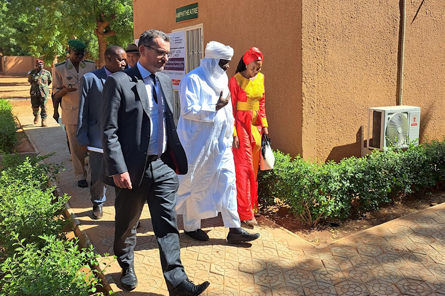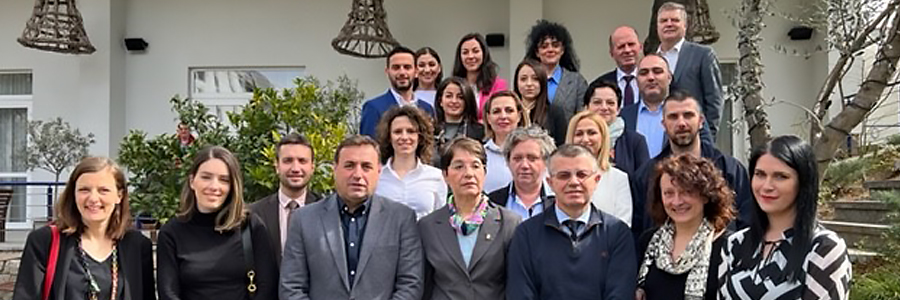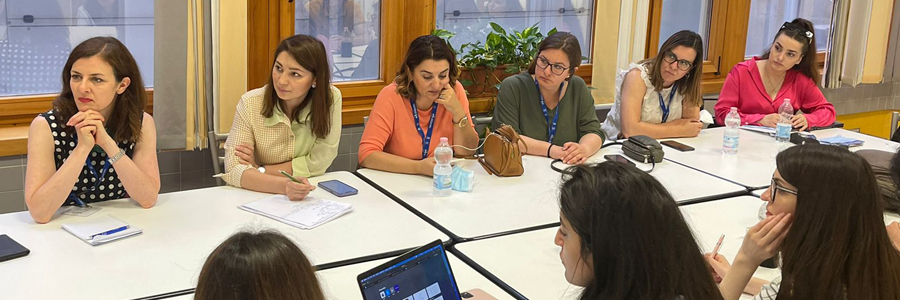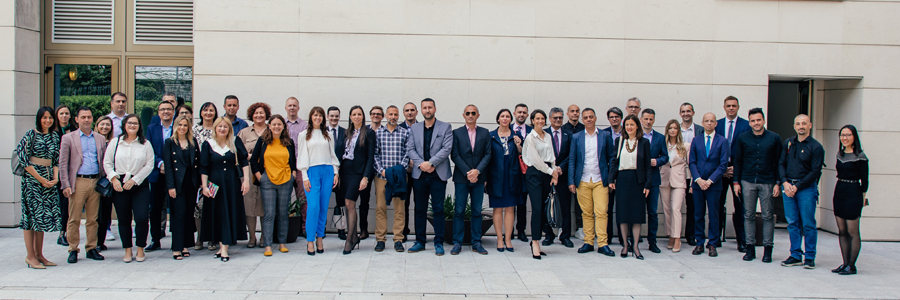Niger
Niger is a member of DCAF’s Foundation Council, in which DCAF has been engaged since 2014, implementing a large-scale national program that currently includes projects funded by Germany and the United Kingdom, aiming at strengthening the accountability of the security sector in Niger contributing to a more responsive provision of security to the needs of the population and the state.
Since 2019, DCAF is also implementing a regional program Enhancing Security Sector Governance (SSG) in the Sahel, funded by Denmark and Norway, with cross-cutting activities in Niger, Burkina Faso, and Mali.
Read our factsheet to get an overview of DCAF's work in Niger in English or French.

Workstreams/Projects
We provide support to Nigerien partners to improve the accountability of their security sector through nationally owned, inclusive, and participatory reforms based on national policy priorities and international norms & good practices (rule of law, human rights, gender equality).
The following are the 3 objectives of our work in Niger:
Strengthening political, strategic and legal frameworks is critical to enhance oversight because it provides the foundation for effective and accountable governance. This includes clear policies, procedures, and laws that define the roles and responsibilities of government institutions, and provide a framework for decision-making, planning, and implementation. Strong frameworks can also help to establish a culture of transparency and accountability and to provide mechanisms for citizens to hold government accountable.
DCAF partners with its national partners in Niger on the following activities:
- Support the elaboration, dissemination, implementation, monitoring and evaluation of policies and strategies related to the security and defence sectors at the central and decentralized levels.
- Assistance for the compilation, inclusive development, and revision of the legal framework of the security and defence sector and enhancing public access to legal databases.
- Capacity building support to the National Center for Strategic and Security Studies (CNESS) and key actors to enhance integration of international and regional standards of security governance into policies.
- Capacity building support to members of the National Assembly’s Standing Committee on Security and Defense (CDS) on policies and legal frameworks to enhance compliance with the principles of security sector governance (human rights, gender equality, parliamentary oversight of security institutions).
- Implementation of regional security sector governance initiatives to strengthen integration, promote good practices, and share lessons learned.
DCAF aims to contribute to increased public trust in the security sector through enhanced oversight by civilian institutions, civil society organizations and the media. When security institutions are subject to external oversight, they are held accountable for their actions and decision-making processes, which promotes responsible and professional behavior, and helps to prevent abuses of power and human rights violations. External oversight also contributes to promote public engagement, helping to build a more informed democratic participation.
The activities DCAF implements in this regard include:
- Capacity building support to oversight actors (HALCIA, ARMP, IGSS, IGAGN, CSOs, media) to prevent corruption and promote transparency and resource management good practices.
- Strengthening the National Assembly’s Standing Committee on Security and Defense (CDS) capacity to implement its five-year action plan and ensure full compliance with the principles of good governance.
- Supporting coordination and exchanges between CSOs and defense and security forces through training, the development of methodological tools, forums, and information sharing.
- Support the capacity of the Ombudsman of the Republic to receive and manage complaints against security and defense institutions, through outreach, training support, data collection and human rights analysis.
- Technical support to human rights monitoring actors (CNDH and CSOs) to improve the quality of investigation procedures and the collection of complaints.
- Promote equal participation to SSG/R processes through the implementation of inclusive capacity building and dialogue initiatives.
We aim for improved accountability, effectiveness, and professionalism of security providers through accompanying security sector institutions towards greater compliance with internal procedures, codes of conduct, and human rights principles. When each member of security institutions can be held accountable for their actions, it promotes responsible behavior and prevents abuse of power and human rights violations. Effective internal control mechanisms contribute to greater compliance with the rule of law and respect for human rights. Improving financial management and human resource management is also critical to building a more sustainable and effective security sector in the medium to long term.
DCAF aims to support security institutions in developing and improving management processes to enhance efficiency and sustainability and to ensure spending is channeled to key needs.
DCAF supports its national partners in Niger through the following:
- Strengthening internal control mechanisms within defense and security institutions to promote compliance with internal procedures, codes of conduct, good resource management practices, and human rights principles
- Supporting the development of leadership and organizational change management skills, strengthening the chain of command, and strengthening management and administrative processes in the security sector.
- Support the capacity of the National Police School (ENP) and the National Gendarmerie School (EGN) to provide training for a more professional and people-oriented security service.
- Providing capacity building to the General Inspectorate of the Army and the National Gendarmerie (IGAGN) and the General Inspectorate of Security Services (IGSS) on risk management and internal control supporting the development and implementation of methodological tools and manuals are their procedures and reporting methodology.
- Assist security services in integrating a gender-sensitive approach into operations and service delivery.
- Assist national security institutions to strengthen their planning and budget formulation capacities so as to adopt more affordable/sustainable approaches to reform in the medium to long term.
- Support to strengthen oversight of the budget cycle to ensure spending is appropriately channeled to key needs and to limit cases of corruption.
- Targeted support in improving transparency and efficiency in the core human resource management processes, including continuing to strengthen gender equality safeguards in human resource policies and processes.
- Assist security institutions to better assess the extent to which resources are efficiently used and to develop internal change management processes to help implement reform strategies or to improve core administrative, command, and management processes that can enhance efficiency.

DCAF supports the Western Balkan economies in their effort to enhance cyber hygiene, both of public sector staff, and of the general public, as well as in their outreach and communication activities. Safe online practices are crucial for cyber resilience. The project supports public institutions in establishing strategic plans on increasing cyber hygiene, and promotes the understanding of cybersecurity risks and threats, encouraging safe and responsible online behaviour.
In order to generate awareness in cybersecurity in the general public and small businesses, DCAF supports cybersecurity actors in the Western Balkans to organise cybersecurity awareness raising campaigns targeted at wider social groups and individuals, with the aim of influencing cybersecurity behavioural change. We support efforts of cybersecurity institutions in the Western Balkans to better communicate the importance of cyber protection, especially focusing on the issues of personal data protection, securing business continuity, rising awareness of cyber threats such as online scams and frauds.
Together with Western Balkan national CERTs, we have developed innovative awareness raising campaign strategies and materials for multimedia and digital tools.
Watch all the animated short clips of the campaign on our YouTube channel
Watch all the videos of the campaign on our YouTube channel
Download and print the posters to raise awareness about cybersecurity around you
Examples of recent activities
- Webinar on Cyber Essentials and Cyber Baseline. December 2021.
- Development of online courses on Cyber Hygiene for Public Servants
- Support to CERTs communication capacities in Albania, Bosnia Herzegovina, Kosovo, Montenegro, and North Macedonia
Knowledge Products
- Handbook on Effective Use of social media for Cybersecurity Awareness Raising Campaigns
- Guidebook on minimum standards for setting up a system of cyber hygiene in public institutions and SMEs (upcoming publication)
- Booklet for national CERTs on Crisis Communication and Communication Plans (upcoming publication)
- E-learning course on Cybersecurity and Good Governance (upcoming course)
- Online course on Cyber Hygiene for Public Servants
 The project contributes to more informed cybersecurity policy discussions, both at the regional and national levels, by encouraging parliamentary staff and civil society organisations to play a more effective role in cybersecurity sector oversight and research.
The project contributes to more informed cybersecurity policy discussions, both at the regional and national levels, by encouraging parliamentary staff and civil society organisations to play a more effective role in cybersecurity sector oversight and research.
Examples of recent activities
- Seminar on Cybersecurity Good Governance for Parliamentary Staffers from the Western Balkans. Tirana, Albania, March 2022.
Knowledge Products
- Introduction to Cybersecurity Governance – A Tool for Members of Parliament
- Guide to Good Governance in Cybersecurity
- Democratic Governance Challenges of Cybersecurity
- Backgrounder on Cybersecurity Governance (upcoming publication)
- Book on Cybersecurity Oversight (upcoming publication)
 DCAF supports civil society and young leaders in their efforts to play a more active role in cybersecurity.
DCAF supports civil society and young leaders in their efforts to play a more active role in cybersecurity.
To contribute to informed regional cybersecurity policy discussions, the project has supported the establishment of a Western Balkans Cybersecurity Research Network, composed of civil society researchers from the region. The network research aspects covering cybersecurity and human rights, cybersecurity needs of vulnerable groups, gender and cybersecurity, in their respective national contexts. This effort produces more comparative research and information on the progress in cybersecurity governance in the region, and supports Western Balkans civil society to engage more in cybersecurity issues and to develop, research, and draft recommendations that promote an approach to cybersecurity taking into account the security needs of all, for governments to integrate a more human-centric approach in their legal and policy frameworks.
Through our ‘Young Faces’ programme, we work on promoting cybersecurity policy research and knowledge sharing among young professionals across the Central and Eastern Europe region, aiming to involve young leaders to explore and engage in cybersecurity network and expertise. The programme champions the development of young professionals from the region, from the public and private sector, at the start of their careers to raise their awareness on important cybersecurity governance challenges. Over the course of 6 months and through a winter and summer schools, the participants can familiarise themselves with the topics, learn from international experts, share experiences with their peers, and play an active role in research of cybersecurity by producing policy papers under the mentorship of experts.
Spotlight: papers from DCAF’s Young Faces 2022
Promising cybersecurity ideas from emerging Western Balkans civil society leaders
DCAF’s Young Faces 2022 brought together 30 young scholars and leaders for enriching seminars on cybersecurity, in the context of the UK Foreign, Commonwealth and Development Office (FCDO) supported-project, ‘Good Governance in Cybersecurity in the Western Balkans’. 14 out of this group wrote policy papers. These covered a range of issues of increasing importance in the six Western Balkans economies of the project: Albania, Bosnia and Herzegovina, Kosovo*, Montenegro, North Macedonia and Serbia.
* This designation is without prejudice to positions on status, and is in line with UNSC 1244 and the ICJ Opinion on the Kosovo declaration of independence.
DCAF spotlights three among all of the thoughtfully written papers:
- Doris Pasha’s ‘E-Governance and the Importance of Personal Data Protection in Albania’;
- Mejreme Asllani’s ‘Cyber Attacks and Critical Infrastructure in Kosovo’; and
- Oliver Risteski’s ‘Intrusions of State Digital Infrastructure in Macedonia: Digital Human Rights Impact Analysis’
Disclaimer: The views expressed are those of the authors alone and do not necessarily reflect DCAF positions.
Examples of recent activities
- Young Faces Winter School Webinars. Online, January 2022.
- Young Faces Summer School and participation in the European Dialogue on Internet Governance (EuroDIG). Trieste, Italy, June 2022.
- Workshop on Gender and Cybersecurity for the Western Balkans Cybersecurity Research Network. Durrës, Albania, July 2022.
- Advocacy campaign by the Western Balkans Cybersecurity Research Network. Western Balkans, Summer 2022.
Knowledge Products
- Cyber Violence Against Women and Girls in the Western Balkans: Selected Case Studies and a Cybersecurity Governance Approach
- Thematic Paper on Gender and Cybersecurity
- Western Balkans Cybersecurity Research Network: a six-chapter publication on Human Rights and Cybersecurity
- Western Balkans Cybersecurity Research Network: a six-chapter publication on Gender and Cybersecurity (upcoming publication)
 DCAF promotes cybersecurity capacity building in the Western Balkans to improve cyber-readiness of the societies through the strategic training of cybersecurity experts and the development of educational program in cybersecurity. The programme supports the inclusion of cybersecurity capacity building in national cybersecurity strategies, and the further development of cybersecurity education at all levels.
DCAF promotes cybersecurity capacity building in the Western Balkans to improve cyber-readiness of the societies through the strategic training of cybersecurity experts and the development of educational program in cybersecurity. The programme supports the inclusion of cybersecurity capacity building in national cybersecurity strategies, and the further development of cybersecurity education at all levels.
- Regional Conference on Cybersecurity Capacity Building. Podgorica, Montenegro, May 2022.
- Report on the Regional Conference on Cybersecurity Capacity Building, Mika Kerttunen, May 2022.
Watch all videos of the conference "Cybersecurity Capacity Building"
Key Resources
Contacts
Jolie-Ruth Morand, Principal Programme Manager (j.morand@dcaf.ch)
Anne Bennett, Head, Africa Americas (a.bennett@dcaf.ch)




